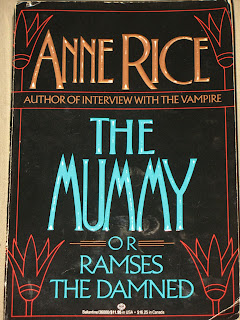The acting space is a square in
the middle of the audience, and there are two television screens at opposite
sides above the audience. A heavily pixelated eye stares at us from each
screen. We are immediately part of the world of the play. We are being watched.
As the audience files in, instrumental renditions of songs like “Que Sera, Sera”
and Monty Python’s “Always Look On The Bright Side Of Life” play. Before the
play begins, the usual announcements are given a delightful twist, and we are
told that The Ministry Of Theatre requires us to silence our cell phones,
providing a laugh and helping to immerse us further into the Orwell’s world. As
the play opens, Winston Smith (Will Thomas McFadden) is lying on the floor,
while four party members (Tom Szymanski, Guebri VanOver, Bob Turton and Hannah
Chodos) surround him. A voice sounds from one corner of the room, and all of
them turn to face that voice. “How did it
begin?” It is a voice of calm authority, a voice that is in control, a
voice that can takes its time. (Tim Robbins provides that voice.) And thus
begins Winston Smith’s interrogation. He is somewhat disheveled, dressed in an
open shirt over a T-shirt, and is barefoot, as if he had been suddenly taken from his home
at night. The four party members take turns becoming the people that Winston is
questioned about and even Winston himself, recreating scenes from Winston’s
diary in order to determine the truth – or, at least, their truth – and to cure
him of his insanity before executing him. But in doing so, they seem to be
affected, even changed somewhat. Or at least one of them is affected thus. It
is fascinating to watch, and the actors do an absolutely tremendous job
creating and inhabiting several different people while still maintaining the
reality of their main characters. Also, they at times move behind the audience,
which makes us feel a bit uneasy, like we ourselves are on trial. We are being
watched.
At a couple of points, the
television screens suddenly show official news footage, interrupting the action
of the play, both for the characters on stage and for those of us in the
audience. All heads turn to those screens, and we are all given the same
information – or misinformation – about production being up or about a victory
in the ongoing war, news that the party members cheer. And you can’t help but
wonder how long it would take before audience members began cheering it as
well. One thing that is interesting is
how rooted the insidious deceit is, popping up in relatively mundane situations.
For example, there is a bit about how the chocolate rations were raised from
five to seven ounces, though Winston recalls that actually the rations had gone
down from ten to seven ounces. Obviously, this is not a matter of life and
death, but the party members keep repeating the lie until Winston gives up. For,
again, it’s not all that important how much chocolate people are receiving. This
scene reminds me of two things – how Donald Trump keeps repeating lies until
people give up contradicting him, and how I recently saw a misleading sale
price at Ralph’s (a grocery store here in Los Angeles). Refried beans were
advertised as being at a new lower price, two for three dollars, when
previously they had actually been a dollar each. The price had gone up, but the
store was claiming the price had gone down. So here we are.
It is also interesting how the
audience finds humor in the play at the beginning, perhaps feeling a
comfortable distance from the action still at that point, but as the play
progresses, the laughter dies away. And by the time that O’Brien shows up in
the flesh, we are in frightening territory. Tim Robbins delivers a chilling
performance, particularly as his O’Brien is so businesslike and rational. Earlier,
when Winston and Julia swear allegiance to the resistance movement, it feels
the same as swearing allegiance to the authoritarian government, which is
interesting and terrifying. They are ready to kill for their cause, and as we’ve
been identifying with these characters, we can’t help but question our own
capabilities for murder, even for a cause we might believe to be just. O’Brien
raises just that point later, questioning Winston’s supposed moral superiority,
and thus calling into question the moral superiority of those in the audience.
And that is partly why attending a performance of this production is a powerful
and intense and ultimately a very personal experience.
This production of 1984 was directed by Tim Robbins, and
runs through December 7th. There is one fifteen-minute intermission, and
including that intermission the performance is approximately two hours and
fifteen minutes. The Actors’ Gang Theater is located at 9070 Venice Blvd. in
Culver City, California. Visit the Actors’ Gang website for full schedule.



